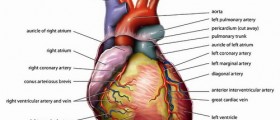
Heart disease facts
Do you know that in the United States, one out of four people die from heart disease every year? That makes about 600, 000 people dying from heart attacks and other heart conditions annually. In fact, heart disease is the number one cause of death for men and women. Risk factors for developing heart disease include family history of the disease, high cholesterol, high blood pressure, obesity, diabetes, physical inactivity, and smoking. Although many Americans have at least one of these factors, it is easy to see that heart disease is a preventable condition. In fact, studies show that 4 out of 5 deaths due to heart disease are preventable.
- Important notification about information and brand names used in this slideshow!
- Photo courtesy of Universitetssykehuset Nord-Norge by Flickr : www.flickr.com/photos/unnfoto/6068321821/
- www.cdc.gov/HeartDisease/facts.htm

Changing your eating habits
According to Dr. Lori Mosca, founder of Columbia University Medical Center's Preventive Cardiology Program, research shows that many people who are concerned with heart health are confused about what type of diet they should consume. They often read about conflicting studies and various recommendations regarding the best diet to adapt for a healthy heart, but the simplest and most reliable way is to follow guidelines set by the American Heart Association and other national organizations. These guidelines include changing your eating habits by consuming low-calorie nutrient-dense foods and avoiding certain foods, which contain empty calories. To make sure that each meal is heart-healthy, experts recommend dividing your plate so that half of it consists of vegetables, a quarter is from high-quality proteins such as legumes, and the other quarter is made up of lean meat or fish.

Keeping a healthy weight
Whether you are young or old, maintaining a healthy weight is important to your well-being. One’s body composition changes as he grows older, often losing muscle mass and gaining more body fat. People are also less active as they age and so they burn fewer calories and gain more weight. Studies show that obesity is a risk factor for heart disease, but how does one know if he is overweight or obese? People who have a BMI (body mass index, a measure of body fat based on one’s weight relative to his height) of 25 and above are overweight, while those who have a BMI greater than 30 are obese. Regardless of BMI, studies show that women who have a waist circumference of more than 35 inches and men whose waists are 40 inches and above are at risk for heart disease and other health problems. It is therefore important for everyone to keep a healthy weight to avoid heart disease.
- Important notification about information and brand names used in this slideshow!
- Photo courtesy of Michael Verhoef by Flickr : www.flickr.com/photos/nettsu/4785047145/
- win.niddk.nih.gov/publications/young_heart.htm
- http://apps.who.int/bmi/index.jsp?introPage=intro_3.html

Regular physical activity is good for your heart
Once again, no matter what age you are, engaging in regular physical activity is good for your heart. Regular exercise not only improves your weight and heart health, but it also enhances your strength, endurance, flexibility, and balance. Even people who are disabled or sick are often encouraged to do some amount of physical activity on a slow but regular basis to improve their body functions. Experts recommend doing a variety of exercises such as cardio or aerobic exercise, muscle-strengthening exercises, and other activities that improve balance and increase flexibility. How much exercise should you do? If you are not overweight, thirty minutes of moderate exercise most days of the week is fine. However, if you need to lose weight, you may have to spread 60 minutes of physical activity throughout the day at least five days a week. The important thing is to avoid long hours of sitting, which can lead to inactivity and overeating, all of which have been associated with heart disease.
- Important notification about information and brand names used in this slideshow!
- Photo courtesy of Mike Baird by Flickr : www.flickr.com/photos/mikebaird/2626778991/
- win.niddk.nih.gov/publications/young_heart.htm
- http://www.webmd.com/heart-disease/features/cardiologists-guide-to-a-healthy-heart?page=2

Control your cholesterol
Controlling your blood cholesterol levels is an important way to reduce your risk for coronary heart disease. Limit your intake of trans fats and saturated fats by avoiding shortening, butter, or margarine and trimming off fat from your meat. Beware of products labeled “reduced fat” but contain partially hydrogenated ingredients, which are actually trans fat. Choose low-fat milk and other-low-fat substitutes in your diet. Use monounsaturated fats from olive oil and canola oil for cooking and making salads, and polyunsaturated fats from seeds and nuts. These types of fat are essential in a heart-healthy diet. However, remember to take these foods in moderation, since all sources of fat have high calorie content.

Quit smoking
According to CDC (Centers for Disease Control and Prevention), there are about 443,000 deaths in the US annually related to cigarette smoking, 126,000 deaths of which are due to ischemic heart disease. Tobacco smoking is the single most preventable cause of many diseases, disability, and premature death. This is the reason for current worldwide efforts to encourage people to quit smoking and to prevent secondhand smoke from affecting other people, especially children. The best way to quit smoking is to set a goal, a quit date, and to change your environment by getting rid of all your cigarettes and ashtrays at home. You can also have a better chance of succeeding if you seek help from family, friends, and other experts who can support your efforts. Other ways include reducing stress, changing routines that encourage smoking and engaging in physical activities or hobbies that may help distract you from smoking.

Drink less alcohol
Many people believe that drinking red wine, as shown by some studies, can reduce one's risk of heart disease. These studies suggest that red wine contains flavonoids and other antioxidants, which have heart protective properties, including increasing levels of "good" cholesterol on the blood. However, experts believe that these effects may be obtained from other food sources and from regular exercise, without the need for consuming alcohol. The American Heart Association states that drinking too much alcohol can increase calorie intake and raise blood triglyceride levels. It can increase your risk for high blood pressure, obesity, diabetes, heart failure and stoke. To reduce the likelihood of developing these conditions, men must limit their alcohol intake to no more than two drinks per day and one drink a day for women.

Depression is linked to heart disease
Depression is a serious disorder that affects not only mental and behavioral function but also the body as a whole. Almost 7% of American adults suffer from depression, a condition that could interfere with daily life and increase one’s risk for heart disease. Studies show that depression is linked with angina and heart attack and it could increase one’s risk of dying after a heart attack. If you suffer from symptoms of depression such as deep sadness, hopelessness, chronic fatigue, insomnia, loss of appetite, overeating, and chronic pain, seek help from friends, family, and mental health experts. Other ways to reduce depression, which could lead to heart disease include increasing physical activity, improving your diet, seeking a hobby, and smoke cessation.

Look at your family tree
Most risk factors for heart disease are modifiable, but there are some, such as aging and family history, which cannot be controlled. Your risk of developing heart disease or suffering from a heart attack is greater if someone in your family suffered or died from these causes. However, even if you inherit the genes that carry this predisposition to heart disease, you can still reduce your chances of morbidity by keeping a healthy weight, maintaining a lifestyle that excludes excessive alcohol consumption and smoking, and being physically active. If you have a family history of other conditions such as diabetes, high cholesterol, or high blood pressure, you must also have yourself examined to find early management of these risk factors that lead to heart disease.

Cut down the stress
Stress is an important risk factor for heart disease. People who experience chronic stress from work, family relationships, financial problems, and other causes often neglect their health. They may lose their appetite or overeat, resulting in either undernourishment or obesity. They may become sedentary, suffer from sleep disturbances, and engage in unhealthy behaviors, such as smoking, alcohol drinking and drug intake. Studies suggest that chronic stress is linked to high blood pressure, obesity, diabetes, and heart disease. Some tips to reduce stress include keeping a positive attitude, getting enough rest and sleep, setting realistic goals and self-expectations, and practicing some relaxation techniques such as deep breathing, meditation and listening to music.


























Your thoughts on this
Loading...